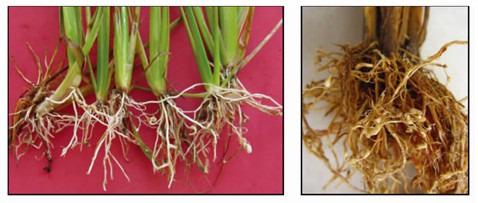Analysis of Rice Root Knot Nematode Diseases
Rice is one of the world's major food crops. Plant parasitic nematodes are one of the most essential soil-borne diseases in rice production. Currently, more than 300 species of nematodes from 35 genera have been reported to parasitize and cause harm to rice. Among them, rice root knot nematode (Meloidogyne graminicola) is the most serious plant parasitic nematode affecting rice yield. The rice root knot nematodes are widely distributed in tropical and subtropical areas, such as China, India, Bangladesh, Thailand, the United States, and other countries.
Lifeasible provides analysis of rice root knot nematode diseases to help our customers worldwide in the field of plant science. Our experts will answer your questions comprehensively and carefully and help you solve the problems in your studies. We guarantee satisfied and reliable results for our customers all over the world.
Pathogen Analysis of Rice Knot Nematode Diseases
Analysis of Infection Characteristics
- Rice root-knot nematodes can harm upland rice, low-depression rice, irrigated rice, and deep-water rice and survive for a long time in the form of egg mass or larvae in flooded soil.
- We provide an analysis of infection characteristics, including larval infection characteristics, adult reinfection characteristics, and life history of rice root knot nematodes. Specifically, we help our clients study root knot size, color, number of nematodes invading the root, and direction of movement.
Analysis of Pathogenic Mechanism
- Pathogenicity of root-knot nematodes includes direct plant damage and indirect plant disease. We help our clients analyze the pathogenic mechanism of rice root knot nematode diseases.
- Mechanical damage is the most direct harm of root-knot nematodes to plants. We help study the role of related hydrolase secreted by nematodes to puncture and degradation of host root tip cells.
- When root-knot nematodes feed, the secretions of the esophagus glands are pathogenic substances, which is the main cause of plant damage. We assist in the analysis of various proteins in secretions, including β-1,4-endoglucanase, pectinate lyase, cellulose-binding protein, branch-acid mutase, calcium reticulin, dilatant protein, and microtubule tissue-binding protein.
- Root knot nematode infection of plants provides opportunities for infection of many pathogens. We help to study rice immune gene expression, hormone metabolism, biosynthesis-related genes and so on.
Lifeasible offers an analysis of rice root knot nematode diseases with customized strategies and design. Our advanced technical platforms help our clients solve the problems they may encounter in research based on decades of experience. If you are interested in our services or have any questions, please feel free to contact us or make an online inquiry.
For research or industrial raw materials, not for personal medical use!
 Fig.1 Root symptoms of rice root-knot nematode.
Fig.1 Root symptoms of rice root-knot nematode.